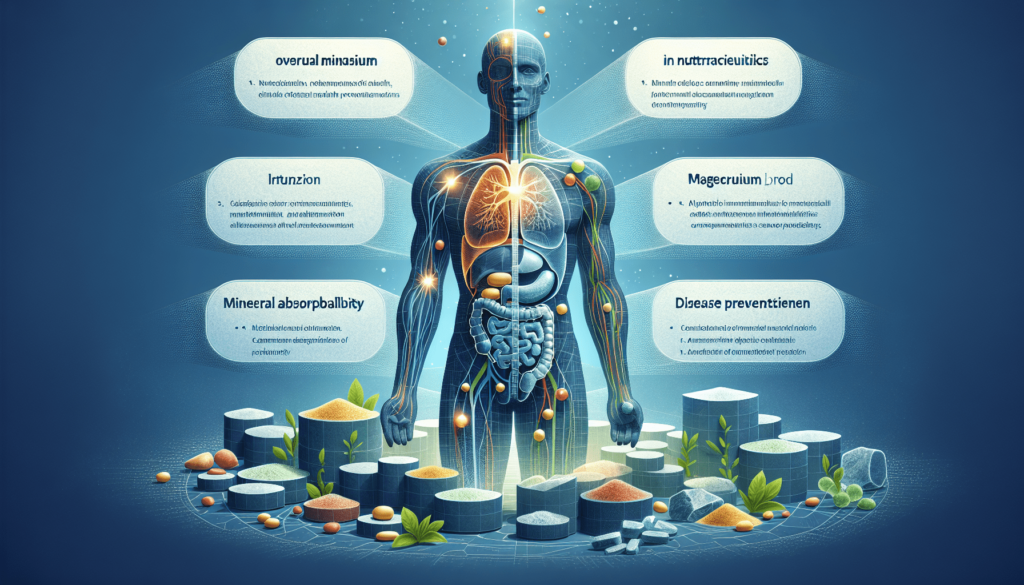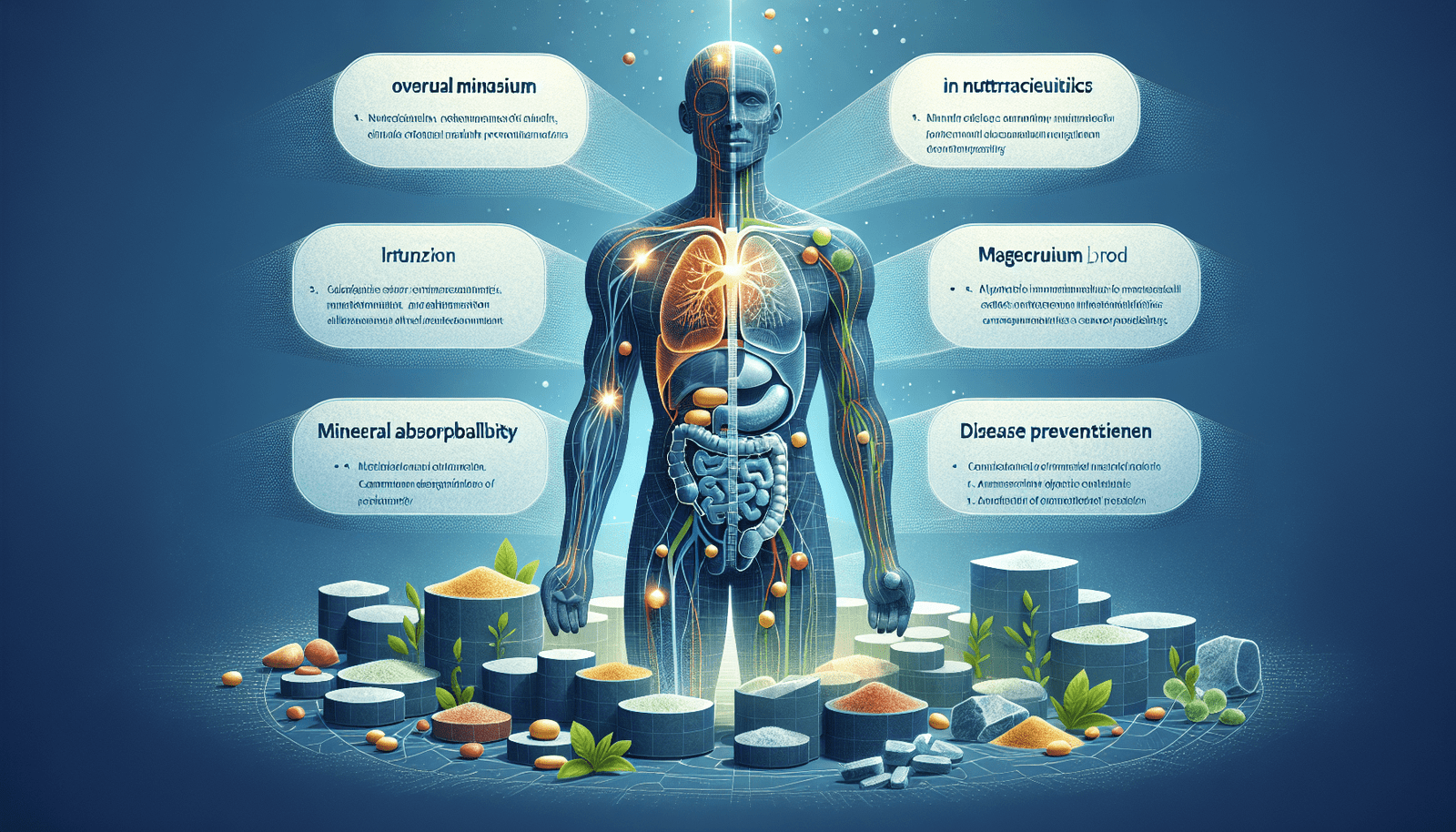Have you ever wondered about the crucial role that minerals play in nutraceuticals? From enhancing overall health to supporting specific bodily functions, minerals are vital components that are often overlooked. In this article, we will explore how minerals contribute to the effectiveness and benefits of nutraceuticals, shedding light on their significance in promoting a healthy lifestyle. So, let’s dive into the fascinating world of minerals and uncover their role in nutraceuticals!

Introduction
In the world of nutraceuticals, minerals play a vital role in supporting and promoting overall health and well-being. These essential inorganic nutrients are necessary for proper bodily functions and contribute to the bioavailability of other nutrients. By enhancing the absorption and utilization of vitamins and minerals, supporting enzymatic processes, promoting bone health, maintaining electrolyte balance, and much more, minerals work synergistically to optimize our health. In this article, we will delve into the importance of minerals, their various functions in nutraceuticals, common minerals found in these products, the implications of mineral deficiencies on health, sources of minerals in nutraceuticals, factors affecting mineral bioavailability, and recommended daily intake of minerals in our diet.
The Importance of Minerals
Role of Minerals in the Human Body
Minerals are essential for the proper functioning of the human body. They are involved in various physiological processes and are required for the maintenance of overall health. From building strong bones and teeth to supporting enzymatic activities and facilitating the production of energy, minerals play a crucial role in every aspect of our bodily functions. They are involved in DNA synthesis, cell division, and repair, as well as the functioning of the nervous and cardiovascular systems. Without minerals, our bodies would not be able to carry out these vital functions efficiently.
Essential Minerals for Proper Bodily Functions
There are various minerals that are essential for our bodies to function optimally. Some of the most important minerals include calcium, magnesium, iron, zinc, potassium, phosphorus, sodium, copper, manganese, and selenium. Each of these minerals has specific roles in supporting different bodily functions, and their deficiencies can lead to various health problems. It is vital to ensure an adequate intake of these minerals through our diet or supplementation to maintain optimal health.
Functions of Minerals in Nutraceuticals
Contributing to the Bioavailability of Nutrients
One of the primary functions of minerals in nutraceuticals is to enhance the bioavailability of other nutrients present in these products. Minerals can form complexes with vitamins, facilitating their absorption and utilization by the body. For example, calcium is necessary for the absorption of vitamin D, which is essential for bone health. By improving the bioavailability of other nutrients, minerals maximize their effectiveness in supporting our health.
Enhancing the Absorption and Utilization of Other Nutrients
Minerals also play a key role in enhancing the absorption and utilization of other nutrients in the body. For example, magnesium is necessary for the absorption and utilization of calcium and vitamin D, which are crucial for bone health. Similarly, zinc is involved in the metabolism of carbohydrates, proteins, and lipids, ensuring that these nutrients are properly utilized by the body. By improving the efficiency of nutrient absorption and utilization, minerals help to optimize our overall health.
Supporting Enzymatic Processes
Minerals are essential for the proper functioning of numerous enzymes in the body. Enzymes are proteins that catalyze biochemical reactions and are involved in various metabolic processes. Many enzymes require specific minerals as cofactors to function effectively. For example, iron is a cofactor for enzymes involved in oxygen transport and energy production, while zinc is necessary for the activity of over 300 enzymes. Without adequate mineral intake, these enzymatic processes may be compromised, leading to suboptimal health.
Promoting Bone Health and Strength
Calcium, magnesium, phosphorus, and manganese are essential minerals for promoting bone health and strength. Calcium is the most abundant mineral in the body and is crucial for the formation and maintenance of strong bones and teeth. Magnesium aids in calcium absorption and plays a role in bone mineralization. Phosphorus is a key component of bones, while manganese supports the formation of bone cartilage. By ensuring an adequate intake of these minerals, we can support the health of our skeletal system.
Maintaining Electrolyte Balance
Minerals such as sodium, potassium, and magnesium are vital for maintaining electrolyte balance in the body. Electrolytes are minerals that carry an electric charge and are crucial for various physiological processes, including maintaining proper hydration, regulating blood pressure, and supporting nerve and muscle function. Sodium and potassium work together to regulate fluid balance and ensure proper nerve conduction and muscle function, while magnesium is involved in over 300 enzymatic reactions, including energy production and muscle relaxation. By including these minerals in our diet, we can maintain optimal electrolyte balance.
Supporting Nerve Conduction and Muscle Function
Minerals also play a crucial role in supporting nerve conduction and muscle function. Calcium, magnesium, potassium, and sodium are particularly important for these processes. Calcium is necessary for nerve transmission and muscle contraction, while magnesium helps to relax muscles after contraction. Potassium and sodium work together to maintain the electrical potential across cell membranes, which is essential for nerve conduction and proper muscle function. By ensuring an adequate intake of these minerals, we can support optimal nerve and muscle health.
Facilitating Cellular Communication and Signaling
Minerals are involved in cellular communication and signaling processes within the body. For example, copper is necessary for the production of neurotransmitters that facilitate communication between nerve cells. Manganese plays a role in the synthesis of connective tissues and is involved in the production of the hormone thyroxine, which regulates metabolism. By including these minerals in our diet, we can support optimal cellular communication and signaling.
Aiding in the Production and Utilization of Energy
Minerals are essential for the production and utilization of energy in the body. Iron is a key component of hemoglobin, the protein responsible for transporting oxygen to cells for energy production. Zinc is involved in the synthesis and storage of insulin, the hormone that regulates blood sugar levels and energy metabolism. By ensuring an adequate intake of these minerals, we can support optimal energy production and utilization.
Enhancing Immune System Function
Minerals also play a vital role in enhancing immune system function. Zinc and selenium, in particular, are crucial for immune system health. Zinc is involved in the development and functioning of immune cells, while selenium supports the production of antioxidant enzymes that protect the immune system from oxidative stress. By including these minerals in our diet, we can support optimal immune system function.
Acting as Antioxidants
Certain minerals, such as selenium and copper, also act as antioxidants in the body. They help neutralize harmful free radicals, which are unstable molecules that can cause oxidative damage to cells and contribute to the development of chronic diseases. By acting as antioxidants, these minerals protect our cells from oxidative stress and support overall health.

Common Minerals Found in Nutraceuticals
There are various common minerals that are commonly found in nutraceuticals, either in their natural form or as supplements. Some of these minerals include calcium, magnesium, iron, zinc, potassium, phosphorus, sodium, copper, manganese, and selenium. These minerals are often added to nutraceutical products to provide additional health benefits and support various bodily functions.
Calcium
Calcium is one of the most abundant minerals in the body and is vital for the development and maintenance of strong bones and teeth. It also plays a role in nerve transmission, muscle contraction, and blood clotting.
Magnesium
Magnesium is involved in more than 300 enzymatic reactions in the body and plays a crucial role in energy production, muscle function, and bone health. It is also involved in regulating blood pressure and maintaining heart health.
Iron
Iron is essential for the production of hemoglobin, the protein responsible for transporting oxygen to cells. It is crucial for energy production, immune system function, and cognitive health.
Zinc
Zinc is involved in numerous enzymatic reactions in the body and plays a role in immune system function, protein synthesis, and wound healing. It also supports reproductive health and plays a crucial role in DNA synthesis and cell division.
Potassium
Potassium is important for maintaining fluid and electrolyte balance in the body. It is involved in nerve conduction, muscle contraction, and maintaining proper heart function. It works in conjunction with sodium to regulate blood pressure.
Phosphorus
Phosphorus is a key component of bones and teeth and is involved in numerous physiological processes, including energy production, DNA synthesis, and cell signaling. It is also important for kidney function.
Sodium
Sodium is an electrolyte that is essential for maintaining fluid balance in the body. It is important for nerve conduction, muscle function, and maintaining proper blood pressure.
Copper
Copper is involved in the production of connective tissues, red blood cells, and certain enzymes. It is important for proper immune system function, iron metabolism, and collagen production.
Manganese
Manganese plays a role in bone formation, connective tissue health, and the metabolism of carbohydrates, proteins, and lipids. It is also involved in antioxidant defense and plays a role in the production of sex hormones.
Selenium
Selenium is a powerful antioxidant and plays a crucial role in immune system function. It is involved in the synthesis of thyroid hormones and supports reproductive health.
Mineral Deficiencies and Health Implications
Causes and Symptoms of Mineral Deficiencies
Mineral deficiencies can occur due to various factors, including inadequate dietary intake, poor absorption, increased nutrient needs, or certain medical conditions. The symptoms of mineral deficiencies depend on the specific mineral and may vary. However, common symptoms include fatigue, weakness, impaired immune function, poor wound healing, muscle cramps, cognitive impairment, and bone abnormalities. Detecting and correcting mineral deficiencies is important to prevent long-term health problems.
Impact on Overall Health and Well-being
Mineral deficiencies can have a significant impact on overall health and well-being. For example, calcium deficiency can lead to weak and brittle bones, increasing the risk of fractures and osteoporosis. Iron deficiency can cause iron-deficiency anemia, characterized by fatigue, weakness, and impaired cognitive function. Zinc deficiency can compromise immune system function, increasing the susceptibility to infections. Each mineral deficiency has its own set of health implications, highlighting the importance of maintaining an adequate intake of these essential nutrients.
Common Health Conditions Associated with Mineral Deficiencies
Mineral deficiencies can contribute to various health conditions. For example, inadequate calcium intake can increase the risk of osteoporosis, a condition characterized by weak and brittle bones. Iron deficiency can lead to iron-deficiency anemia, which can cause fatigue, weakness, and impaired cognitive function. Zinc deficiency is associated with impaired immune system function and can increase the risk of infections. Copper deficiency can lead to anemia and bone abnormalities. Selenium deficiency is associated with weakened immune system function and increased risk of certain cancers. It is crucial to address mineral deficiencies to prevent these health conditions.
Sources of Minerals in Nutraceuticals
Plant-Based Sources
Many nutraceutical products derive their mineral content from plant-based sources. Plants absorb minerals from the soil and incorporate them into their tissues. Fruits, vegetables, whole grains, nuts, and seeds are excellent sources of various minerals. For example, leafy greens such as spinach and kale are rich in calcium and magnesium. Legumes, such as beans and lentils, are good sources of iron, zinc, and potassium. Including a variety of plant-based foods in your diet can help ensure an adequate intake of minerals.
Animal-Based Sources
Certain nutraceutical products may also contain minerals from animal-based sources. Animal products such as meat, poultry, fish, and dairy are rich in minerals such as iron, zinc, and calcium. For example, lean cuts of beef and poultry are good sources of iron, while dairy products are high in calcium. Including these animal-based foods in your diet can provide additional sources of minerals.
Mineral Supplements
In addition to obtaining minerals from food sources, nutraceuticals may also contain mineral supplements. These supplements are typically derived from natural sources and are processed to concentrate the minerals. Mineral supplements can be beneficial for individuals who may have difficulty meeting their mineral needs through diet alone or for those with specific dietary restrictions. However, it is important to consult with a healthcare professional before starting any mineral supplementation regimen.
Factors Affecting Mineral Bioavailability
Nutritional Status
The nutritional status of an individual can influence the bioavailability of minerals. Deficiencies or excesses of other nutrients can affect the absorption and utilization of minerals. For example, vitamin D is necessary for the absorption of calcium, while vitamin C enhances the absorption of iron. Maintaining a balanced and varied diet that includes a diversity of nutrient-rich foods can help optimize mineral bioavailability.
Gut Health and Digestive Function
The health of the gastrointestinal tract and digestive function can affect mineral absorption. Certain conditions, such as inflammatory bowel disease, celiac disease, and gut infections, can impair the absorption of minerals. Good gut health, including a balanced gut microbiome, is crucial for optimal mineral absorption. Consuming foods that promote gut health, such as probiotics and fermented foods, can support mineral absorption.
Presence of Other Dietary Compounds
The presence of other dietary compounds can affect mineral bioavailability. For example, phytates, oxalates, and tannins found in certain plant-based foods can bind to minerals and reduce their absorption. On the other hand, some compounds, such as vitamin C, enhance the absorption of certain minerals. It is important to balance the intake of these compounds to optimize mineral bioavailability.
Food Processing and Preparation Techniques
Food processing and preparation techniques can influence the bioavailability of minerals. For example, cooking can enhance the bioavailability of certain minerals, while excessive processing and refining can deplete minerals. Choosing minimally processed foods and cooking methods that preserve nutrient content can help maximize mineral bioavailability.
Recommended Daily Intake of Minerals in Nutraceuticals
Dietary Reference Intakes
The recommended daily intake of minerals varies depending on age, sex, physiological condition, and overall health. Dietary Reference Intakes (DRIs) provide guidelines for the amount of minerals needed to meet the nutritional needs of individuals. DRIs include the Recommended Dietary Allowance (RDA), which represents the average daily intake sufficient to meet the nutritional needs of most individuals, as well as the Tolerable Upper Intake Level (UL), which represents the maximum amount unlikely to cause adverse effects. It is important to refer to these guidelines to ensure a balanced and adequate intake of minerals.
Different Requirements for Different Age Groups and Physiological Conditions
Different age groups and physiological conditions have varying mineral requirements. For example, infants, children, and adolescents require higher amounts of certain minerals for growth and development. Pregnant and lactating individuals also have increased mineral requirements to support the developing fetus and provide nutrients for breastfeeding. Elderly individuals may require higher mineral intake to compensate for decreased absorption and increased nutrient needs. Understanding the specific mineral needs for different age groups and physiological conditions is essential for maintaining optimal health.
Conclusion
Minerals play a crucial role in supporting overall health and well-being. From contributing to the bioavailability of other nutrients and enhancing their absorption and utilization to promoting bone health, supporting enzymatic processes, and maintaining electrolyte balance, minerals are vital for our bodily functions. Nutraceuticals, which contain various minerals in their natural form or as supplements, provide a convenient way to meet our mineral needs. By understanding the importance of minerals, their functions in nutraceuticals, the implications of mineral deficiencies, and factors affecting mineral bioavailability, we can make informed choices to optimize our health and well-being. Remember to consult with a healthcare professional before making any significant changes or starting any supplementation regimen. Keep your mineral intake balanced, varied, and well-sourced from a combination of plant-based and animal-based sources to ensure you meet your body’s mineral requirements.
